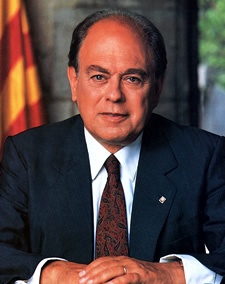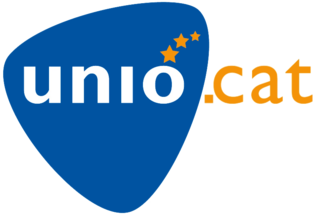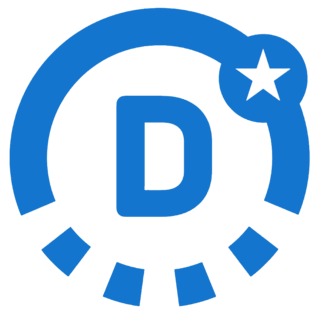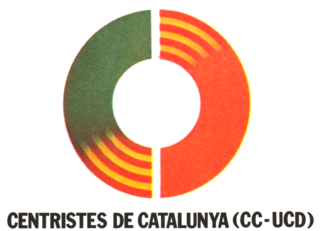
Jordi Pujol i Soley is a retired Catalan politician who was the leader of the party Convergència Democràtica de Catalunya (CDC) from 1974 to 2003, and President of the Generalitat de Catalunya from 1980 to 2003.

The Democratic Convergence of Catalonia, frequently shortened as Convergence was a Catalan nationalist, liberal political party in Catalonia (Spain), currently still existing without any political activity.

The Democratic Union of Catalonia, frequently shortened as Union, was a regionalist, Christian-democratic political party in the Catalonia region of Spain existing between 1931 and 2017. Together with Democratic Convergence of Catalonia (CDC), they formed the Convergence and Union (CiU) alliance and federation from 1978 until its dissolution in 2015, under which they would rule the government of Catalonia for almost three decades during the recent Spanish democratic period.

Lluís Llach i Grande is a Spanish Catalan singer-songwriter, novelist and politician. He is one of the main representatives of the nova cançó genre and an outspoken advocate of the right to self-determination of Catalonia. His most famous song, "L'Estaca", has become the unofficial anthem of the Catalan independence movement. He was a member of the Catalan Parliament from September 2015 until January 2018.

The Socialist Party of Majorca, officially PSM–Entesa after the incorporation of Entesa per Mallorca (ExM) in February 2013, is a political party in Majorca, Spain. The PSM defines itself as socialist, environmentalist, and Catalan nationalist, from a Majorcan point of view.
A referendum on the approval of the Catalan Statute of Autonomy was held in Catalonia on Thursday, 25 October 1979. Voters were asked whether they ratified a proposed Statute of Autonomy of Catalonia bill organizing the provinces of Barcelona, Gerona, Lérida and Tarragona into an autonomous community of Spain. The final draft of the bill had been approved by the Catalan Assembly of Parliamentarians on 29 December 1978, and by the Congress of Deputies on 13 August 1979, but it required ratification through a binding referendum and its subsequent approval by the Spanish Cortes Generales, as established by Article 151 of the Spanish Constitution of 1978. The referendum was held simultaneously with a similar vote in the Basque Country.

Democrats of Catalonia is a Christian-democratic, pro-Catalan independence political party in Catalonia founded in July 2015 from a split in Democratic Union of Catalonia (UDC). Its members included the then-Speaker of the Catalan parliament Núria de Gispert and former UDC president Joan Rigol. The party has received accusations of xenophobia for its controversial statements against Spaniards, and for having ties with xenophobic organizations.
The Democratic Pact for Catalonia was a Catalan electoral alliance established in May 1977 ahead of the Spanish Congress of Deputies 15 June election. It ran on a political platform emphasizing the need of approving a statute of autonomy for Catalonia. The coalition comprised members from two separate, previously established alliances: Democratic Convergence of Catalonia (CDC) and Democratic Left of Catalonia (EDC) from the Democratic Front for Catalonia, and the Socialist Party of Catalonia–Regrouping (PSC–R) and the National Front of Catalonia (FNC) from the Left Front.

Democratic Left of Catalonia was a political party in Catalonia (Spain). EDC was founded in 1975 as the Catalan Liberal Party, and ideologically it defined itself as "radical liberal" and federalist. It was merged into Democratic Convergence of Catalonia (CDC) on 27 June 1978.
Republican Left of Catalonia–Catalonia Yes was a Catalan pro-independence electoral alliance. The alliance was formed by Republican Left of Catalonia, Catalonia Yes and independents, and in the 2015 and 2016 Spanish general elections it was led by Gabriel Rufián.

Union of the Centre and Christian Democracy of Catalonia was an electoral coalition formed in Catalonia in December 1976 to contest the Spanish Congress of Deputies election of 1977, the first democratic election to be held in Spain since the Second Spanish Republic. It was formed by the Catalan Centre (CC) and the historic Democratic Union of Catalonia (UDC), and came to be supported by the Christian Democratic Team of the Spanish State, which did not run on its own in Catalonia. The coalition was officially registered on 3 May 1977. The alliance dissolved shortly after the election upon the start of the newly elected parliament, with UDC deputy Antón Cañellas joining the Catalan–Basque Group and Carlos Güell going into the Mixed Group.

Socialists of Catalonia was an electoral alliance formed to contest the 1977 Spanish Congress of Deputies election in Catalonia, comprising both the Socialist Party of Catalonia–Congress (PSC–C) and the Catalan Socialist Federation (PSOE). It was dissolved in 1978 when its two components merged with the Socialist Party of Catalonia–Regrouping (PSC–R) into the Socialists' Party of Catalonia (PSC).

The 1980 Catalan regional election was held on Thursday, 20 March 1980, to elect the 1st Parliament of the autonomous community of Catalonia. All 135 seats in the Parliament were up for election. This was the first regional election to be held in Catalonia since the Spanish transition to democracy and the second democratic regional election in Catalan history after that of 1932.

Left of Catalonia–Electoral Democratic Front, often shortened as just Left of Catalonia, was a left-wing political platform in Catalonia, formed by Republican Left of Catalonia (ERC), the Party of Labour of Catalonia (PTC) and Catalan State (EC) to contest the 1977 Spanish general election. The alliance was formed to allow the three parties to run for election, as they had not been yet legalized at the time. The alliance ran lists in all four Catalan constituencies for the Congress of Deputies, whereas for the Spanish Senate it supported the Agreement of the Catalans coalition. Its referent at the Spanish level was the Democratic Left Front (FDI).

Centrists of Catalonia was a Catalan-based electoral alliance formed in June 1978 ahead of the upcoming local and general elections, comprising the Catalan section of the Union of the Democratic Centre (UCD), the Union of the Centre of Catalonia (UCC) and the Democratic Union–Broad Centre (UDCA). The alliance was maintained after the election, with UCD and UDCA agreeing to transform it into a full-fledged political party in December 1979 with the disagreement of the UCC, which chose not to join the new party. At its foundation congress held on 22 December 1979, Antón Cañellas was elected as new party president.

Together for Catalonia was an electoral and parliamentary alliance in Catalonia, registered as a political party in the interior ministry in July 2018, originally envisaged as a platform comprising the Catalan European Democratic Party (PDeCAT), successor of the late Democratic Convergence of Catalonia (CDC), and independents and centered around the candidacy of former Catalan president Carles Puigdemont ahead of the 2017 Catalan regional election. Some of these independents went on to form the Action for the Republic (AxR) political party, which is also part of the alliance in the Parliament of Catalonia.
Agreement of the Catalans was a Catalan electoral alliance formed by the Socialist Party of Catalonia–Congress (PSC–C), the Catalan Socialist Federation (FSC), the Unified Socialist Party of Catalonia (PSUC) and the Left of Catalonia platform—supported by the still-illegal Republican Left of Catalonia (ERC), Party of Labour of Catalonia (PTC) and Catalan State (EC)—to contest the 1977 Spanish Senate election. Securing 12 out of the 16 Catalan senators at stake, the alliance's performance has been considered a historical success.
Democracy and Catalonia was a Catalan electoral alliance formed by Democratic Convergence of Catalonia (CDC), Democratic Left of Catalonia (EDC), Democratic Union of Catalonia (UDC) and Socialist Party of Catalonia–Regrouping (PSC–R) to contest the 1977 Spanish Senate election.

The Social Democratic Party of Catalonia was a political party in Catalonia, led by Jaume Casanovas and defining itself as left liberal, that split from Democratic Left of Catalonia (EDC) in April 1976 over leadership rather than ideological disagreements. The party would join the Spanish Social Democratic Federation of Francisco Fernández Ordóñez and José Ramón Lasuén.














